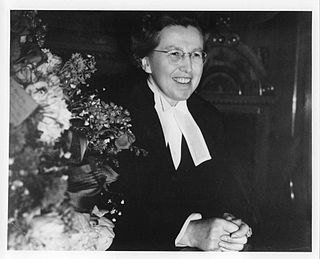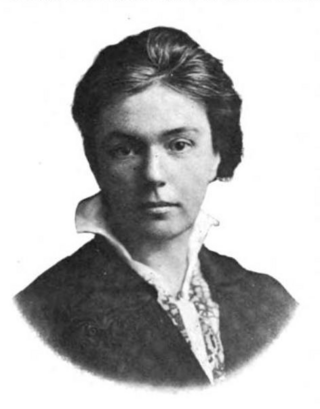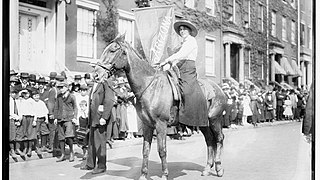Related Research Articles

Helen Alice Kinnear, was a Canadian lawyer and judge. She was the first woman in the British Commonwealth to be made a King's Counsel, the first female lawyer to argue before the Supreme Court of Canada, and the first woman appointed as a judge by the Government of Canada.

Mary Philbrook (1872–1958) was the first female attorney in New Jersey, and the first female to be admitted to the bar association in New Jersey. The New Jersey Supreme Court initially refused Philbrook's petition in 1894 on the grounds that no other woman in the state had ever sought admission to the bar. Supporting the New Jersey Woman Suffrage Association, she lobbied in the New Jersey legislature to allow women to practice law. She was finally admitted to the bar in 1895. She used her legal training for the advancement of women's rights, the social settlement movement in Jersey City, and the gender-free writing of the New Jersey Constitution of 1947. As a result, she is known as a prominent New Jersey woman in the fight for equal rights

Catharine Gouger Waugh McCulloch was an American lawyer, suffragist, and reformer. She actively lobbied for women's suffrage at the local, state, and national levels as a leader in the Illinois Equal Suffrage Association, Chicago Political Equality League, and National American Woman Suffrage Association. She was the first woman elected Justice of the Peace in Illinois.

Myra Colby Bradwell was an American publisher and political activist. She attempted in 1869 to become the first woman to be admitted to the Illinois bar to practice law, but was denied admission by the Illinois Supreme Court in 1870 and the United States Supreme Court in 1873, in rulings upholding a separate women's sphere. Bradwell had founded and published Chicago Legal News from 1868, reporting on the law and continued that work. Meanwhile, influenced by her case, in 1872 the Illinois legislature passed a state law prohibiting gender discrimination in admission to any occupation or profession.

Lorna Elizabeth Lockwood was an American lawyer and judge who served as justice of the Arizona Supreme Court.

Coral Wong Pietsch is an American lawyer who serves as a judge of the United States Court of Appeals for Veterans Claims. She is a former brigadier general in the United States Army Reserve. In 2001 she became the first female general officer in the Army Judge Advocate General's (JAG) Corps, and the first Asian-American woman to reach general officer rank in the United States Army.

Sarah Herring Sorin was Arizona's first woman attorney and the first woman to try a case in front of the United States Supreme Court unassisted by a male attorney. Sorin practiced law with her father William Herring in the firm "Herring & Sorin" initially in Tombstone, Arizona, and later in Tucson. After her father's death, Sorin moved to Globe, Arizona, where she became the attorney for the Old Dominion Copper Company and United Globe Mines. Sarah Sorin is a member of the Arizona Women's Hall of Fame.

Bonnie J. Campbell is an American attorney and politician who served as Attorney General of Iowa from 1991 to 1995. Campbell was also a gubernatorial candidate, an official in the U.S. Department of Justice. President Clinton nominated her to be a judge on the U.S. Court of Appeals for the Eighth Circuit but the Senate never acted on her nomination.
Fennemore Craig, P.C. is a Mountain West regional law firm that offers clients legal services in both litigation and commercial transactions.

Sue Shelton White, called Miss Sue, was a feminist leader originally from Henderson, Tennessee, who served as a national leader of the women's suffrage movement, member of the Silent Sentinels and editor of The Suffragist.

Elsie Hill was an American suffragist, as were her sisters Clara and Helena Hill.
Hermine Tobolowsky was an American activist for the Equal Rights Amendment. She is also known as the "Mother of the Texas Equal Rights Amendment."

Anna Christy Fall was an American lawyer. She was the "first woman lawyer in Massachusetts to plead a case before a jury and the first to argue before the Massachusetts Supreme Court".

Annie MacDonald Langstaff was a Canadian law student, legal activist, supporter of women's suffrage and an early woman aviator. Born in Ontario in 1887, she graduated from Prescott High School and then married in 1904. Her husband quickly abandoned her, leaving her a single mother. Moving to Montreal in 1906, she began working as a stenographer in the law office of Samuel William Jacobs, who encouraged her to study law. Finding no barriers to her admission, Langstaff enrolled at McGill University in 1911, graduating three years later as a Bachelor of Civil Law. On applying to the Bar of Montreal to practice, she was refused the right to take the examination.

Jailed for Freedom is a book by Doris Stevens. Originally published in 1920, it was reissued by New Sage Press in 1995 in commemoration of the 75th anniversary of the 19th Amendment to the U.S. Constitution. This commemorative edition was edited by Carol O'Hare to update the language for a modern audience. Jailed for Freedom was reissued again in 2020 in a 100th anniversary edition.
Martha Blue is an American lawyer and author. She is a partner in the Arizona law firm of Wade and Blue.

The movement for women's suffrage in Arizona began in the late 1800s. After women's suffrage was narrowly voted down at the 1891 Arizona Constitutional Convention, prominent suffragettes such as Josephine Brawley Hughes and Laura M. Johns formed the Arizona Suffrage Association and began touring the state campaigning for women's right to vote. Momentum built throughout the decade, and after a strenuous campaign in 1903, a woman's suffrage bill passed both houses of the legislature but was ultimately vetoed by Governor Alexander Oswald Brodie.

Efforts toward women's suffrage began early in Iowa's history. During the territory's Constitutional Convention, discussions on both African American and women's suffrage took place. Early on, women's rights were discussed in the state by women such as Amelia Bloomer and petitions for suffrage were sent to the Iowa state legislature. While African American men earned the right to vote in 1868, women from all backgrounds had to continue to agitate for enfranchisement. One of the first suffrage groups was formed in Dubuque in 1869. Not long after, a state suffrage convention was held in Mount Pleasant in 1870. Iowa suffragists focused on organizing and lobbying the state legislature. In 1894, women gained the right to vote on municipal bond and tax issues and also in school elections. These rights were immediately utilized by women who turned out in good numbers to vote on these issues. By the 1910s, the state legislature finally passed in successive sessions a women's suffrage amendment to the state constitution. This resulted in a voter referendum to be held on the issue on June 5, 1916. The campaign included anti-suffrage agitation from liquor interests who claimed that women's suffrage would cause higher taxes. The amendment was defeated, though a subsequent investigation turned up a large amount of fraud. However, the election could not be invalidated and women had to wait to vote. On July 2, 1919, Iowa became the tenth state to ratify the Nineteenth Amendment.

Lady Willie Forbus was an American politician in the state of Washington. A Democrat, she was a member of the Washington State Senate for the 44th district from 1943 to 1947.
References
- 1 2 3 4 5 6 7 8 9 10 11 12 13 "Biographical Sketch of Alice Mabeth Birdsall | Alexander Street Documents". documents.alexanderstreet.com. Retrieved 2023-11-19.
- 1 2 3 "Alice M. Birdsall". AWHF. Retrieved 2023-11-19.
- 1 2 3 Watts, Stan (2007). A Legal History of Maricopa County. Arcadia Publishing. p. 34. ISBN 978-0-7385-4815-9.
- ↑ Jacquelyn Gayle Kasper, Sarah Herring Sorin: Arizona's First Woman Lawyer, 12 W. LEGAL Hist. 211 (1999).
- ↑ Lo Vecchio, Janolyn (2002). ""GIVE US THE CHANCE TO GO ALL THE WAY": The Struggle of Arizona Women to Sit on Juries, 1921-1945". The Journal of Arizona History. 43 (4): 343–368. ISSN 0021-9053. JSTOR 41696734.
- ↑ "Work of Women in Late Drive Liberty Loan". Arizona Republican. November 11, 1917. Retrieved November 19, 2023.
- ↑ Osselaer, Heidi J. (2016-05-26). Winning Their Place: Arizona Women in Politics, 1883-1950. University of Arizona Press. ISBN 978-0-8165-3472-2.